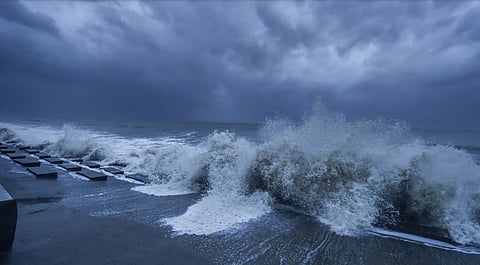

Cyclones, more so tropical cyclones, are usually large scale and destructive. But now the worry is that the mixing of oceans and cyclones is reducing the sea surface temperature and this is reducing evaporation, which will lead to an increase in the intensity of cyclones in coming times.
Explaining the recent study titled Enhanced Ocean Mixing During the Passage of Tropical Cyclone, the researchers explained that temperatures are dropping by 0.5 degree Celsius and sea surfaces are getting colder.
The study was conducted by researchers from the Centre for Atmospheric and Oceanic Sciences (CAOS), Indian Institute of Science (IISc), which was also published in the AGU, Advancing Earth and Space Sciences, according to a report by The New Indian Express.
The study stated that in a warming climate, with increasing intensity of powerful tropical cyclones, better knowledge of upper ocean turbulent mixing is necessary for improved forecasting.
“Powerful winds in cyclones cause vigorous mixing in the upper ocean, they cool the sea surface temperature and influence cyclone intensification. Using high-fidelity simulations and observations, the research team demonstrated the synergy between ocean convection and shear driven processes to change the upper ocean state. Due to temporally varying surface forces, the upper ocean mixing was also highly variable. The study provided new insights into the energetics of such an extreme event where both wind stress and surface cooling are present,” said the study paper.
Devang Falor, co-author of the study, said that during the one-and-half year study period, the team studied cyclones and impacts on the Bay of Bengal, from January 2023 to January 2024, stated The New Indian Express report.
Falor, Prime Minister's Research Fellow (PMRF) and CAOS student, said mixing of oceans and cyclones changes the potential energy before and after the cyclones. Multiple simulation studies were done and change in energy was analysed. A temperature drop of 0.5 degree Celsius was found, which means evaporation will be less and moisture in the atmosphere will also drop.
